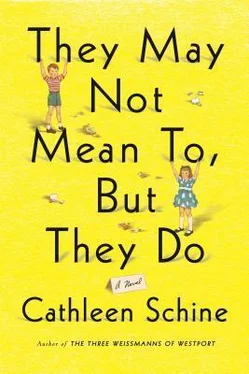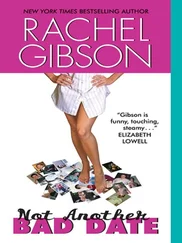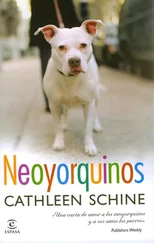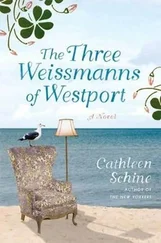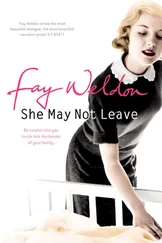“It was all so long ago,” she said. “And it’s still too soon.”
For weeks, thick, heavy invitations had been arriving for Ruby, a glory of colors and raised types and complicated inserts. One had a pop-up basketball net and ball, another a locker opening to reveal “baseball cards” featuring the bar mitzvah boy, a cute little boy disfigured by a wad presumably of gum meant to look like chewing tobacco, at bat and leaping for a fly ball. One was a flat pink satin box that opened to reveal not only the invitation but also a string of fake pearls.
Coco collected the mail each day with increasing dread. What origami of excess would fly from the mailbox next?
“Aren’t there any nice little gentile children in your school? This is crazy. I guess we better send out our invitations soon,” she said.
“Mommy, it’s months from now.”
Coco fingered the flowered chiffon of one invitation and marveled at it. She had no idea what kind of invitation Ruby would want. A sparkly corncob pipe in honor of Tom Sawyer? Pop-up Dead Sea scrolls to show her seriousness?
“But you will have to have a party. And you’ll need party clothes.”
“Yes, Mother, that does follow.”
Ruby refused to partake in either the excitement or the dread of the social aspect of her coming-of-age.
“As if it all just happens by itself,” Coco said to Daniel one night. “I don’t know what to do. I’m not a party planner and I’m not a mind reader.” She had gone to Sunday school at a Reform temple. She could not remember a single bar or bat mitzvah growing up. “I’m out of my depth.”
“Well, just Google it, I guess.”
When she did Google “bat mitzvah,” she saw dresses that looked to her like figure-skating costumes on thirty-year-old prostitutes. She saw professionally produced videos of little girls dressed as rainbow-hued rappers lip-synching hip-hop songs.
“Daniel, we are in big trouble.”
Whenever Coco tried to get Ruby to discuss plans for the bat mitzvah, Ruby was busy doing her homework or studying Hebrew.
“Can’t have a party if I can’t do the service, Mother,” she would say in her new sarcastic way. Mo-ther: Coco noted how ludicrous a status the word suggested.
Finally, Coco ambushed her as she came in from school. “Ruby, sit down. Now.”
Ruby slammed herself down on the couch and crossed her arms. “Hello to you, too, Mo-ther.”
“About your bat mitzvah…”
“You can’t talk me out of it, so don’t even try.”
“I don’t want to talk you out of it. What makes you think I want to talk you out of it?”
In truth, though she would never have admitted it to her mother, Ruby was getting a little worn down by Judaism. There were an awful lot of rules. And poor old God was always so annoyed with his chosen people. Rabbi Kenny explained the historical context of the rules and explained the relationship between God and his people as a dynamic one. She liked talking to Rabbi Kenny. She was still mesmerized by his physical beauty. His eyes were the color of sapphires. And she liked learning the alphabet, the sounds of the language, ancient and secret. She liked to chant, and she liked to think about Genesis and the big bang. All in all, it had been a satisfying hobby. But it was nearly summer. Her best friend, Alexandra, went to a stable in Riverdale twice a week to go horseback riding. Ruby started to go with her. In August they were going to riding camp together.
“I study my Hebrew,” Ruby said. “I go to services. What do you want from my life? I’m very assiduous.”
You are very supercilious, Coco thought. Put that in your adolescent vocabulary book. But she took a deep breath, reminded herself of the angst of being twelve, an angst she could still remember all too well, and she looked lovingly at the skinny girl sucking on her braces and said, “The party, honey. The invitations. The, you know, the theme. Like the girls on YouTube…”
“Mommy!”
“… I suppose you could make a Katy Perry video. You like her.”
“Mommy, stop! I don’t want to be on YouTube. That’s, that’s … suburban.”
Relieved, infinitely relieved, Coco silently thanked the heavens above. “No Katy Perry, then?”
“Mommy, Katy Perry is for babies. Honestly, Mother.”
“Oh.”
“Katy Perry,” Ruby was muttering with disdain. “God, Mommy, you should know me better than that.”
“You don’t want a Tom Sawyer party, I suppose.”
Ruby burst out laughing. Her braces sparkled in the lamplight. “You’re hilarious,” she said, leaning companionably against her mother.
They sat like that for a few minutes, enjoying the contact. Don’t grow up, please, Coco thought. Just don’t do it. Just don’t.
Joy checked the gigantic calendar she had gotten for Aaron to help him keep track of passing time. She allowed herself a moment of pathos: Time is no more for Aaron Bergman. Time has passed him by. Then she lay down on the couch and elevated her legs and prayed for time to pass a little more quickly for herself. Only a few days until she could escape to Upstate. She was rattled by Karl’s proposition. A temptation, there was no doubt about that.
The pleasure of existing in a man’s memory as someone young and beautiful and alluring, and the place Karl held in her own memory, a young man besotted and devoted — those were powerful forces that rose delightfully to the surface whenever she saw him, when she thought about him, too. There was also the physical frisson, it was still there, the few ancient remaining hormones rearing their heads like old warhorses at the sound of a trumpet.
Standing beside Karl beneath an awning on Fifth Avenue during a sudden rain shower, close, their shoulders pressing.
Just the two of them.
And the red walker. And Marta.
Well, a nice diversion from bereavement and lamentation, that’s how she put it to herself. And added to that was the thought of not being alone. Solitude is not my thing, she said out loud. But was living with a new old man her thing? She didn’t know, and all she wanted to do was to see her house in Upstate New York, her white-shingled house with its wavy asphalt roof and rusting porch swing, her own house, nestled among its trees on top of its hill, the stream running merrily below. Someone like Karl, a man who had made his fortune and kept it, might not think much of a house like hers. But it was hers, her own house, unencumbered; she had fought to keep it safe, and now, she thought, it would keep her safe.
She wished she had named it the way people do in English novels. The Remedy, she could call it.
But they all just called it Upstate, and she loved it whatever its name. Every room looked out at different trees she had watched grow over the years, maple trees and birch trees and a weeping willow. The floors squeaked exactly where she expected them to.
She wanted to be in the house immediately, almost feverishly. She could feel the give of the noisy floorboards beneath her feet. She would yank open the windows and let the breeze in, let in the sound of leaves rustling.
Everything in her life had changed when Aaron died. But not the house. The house was not shaken by Aaron’s death, it had been through death already, her father’s, then her mother’s, and it had survived. Once she got to the house, Joy thought, she would finally feel at home again.
For the last decade, ever since Aaron had begun to fade, Joy had hired a car to drive them and their stuff to the house Upstate for the summer, always the same car and driver, an aging Vietnam vet from the town nearest their house. The car, a resplendent used limousine he had gotten from a national limo service when it was a mere six years old, was close to twenty now. The driver, Mr. Bailey, was in his seventies.
Читать дальше
